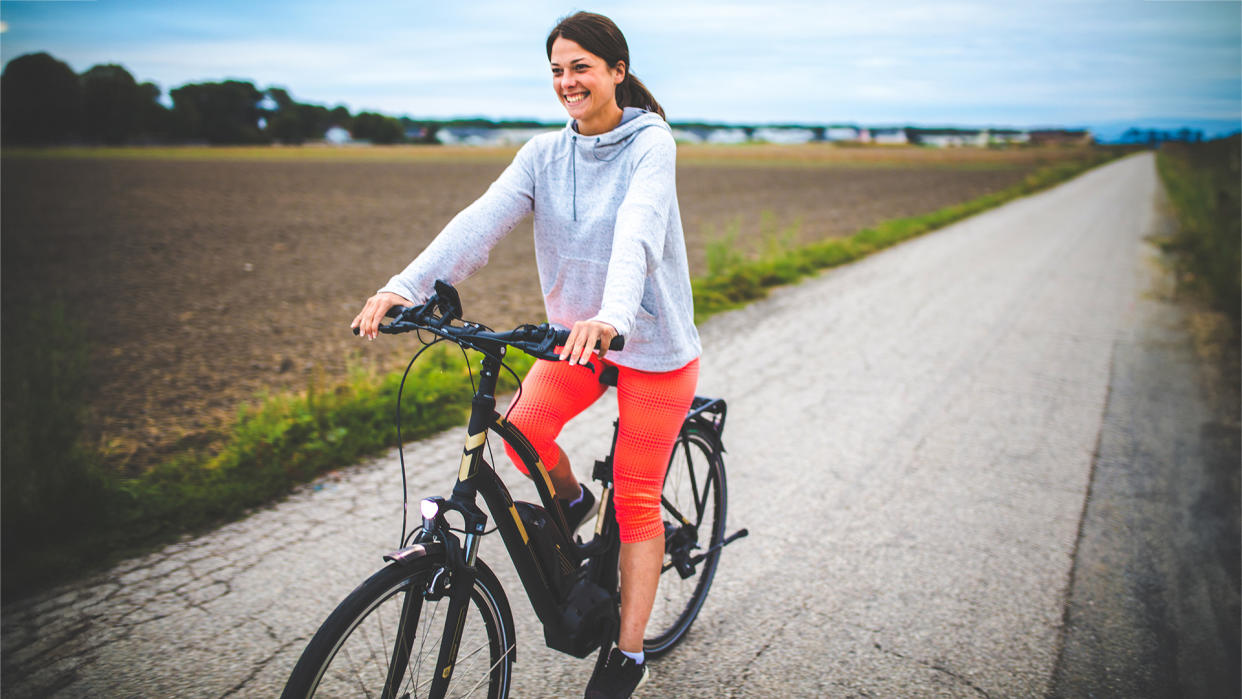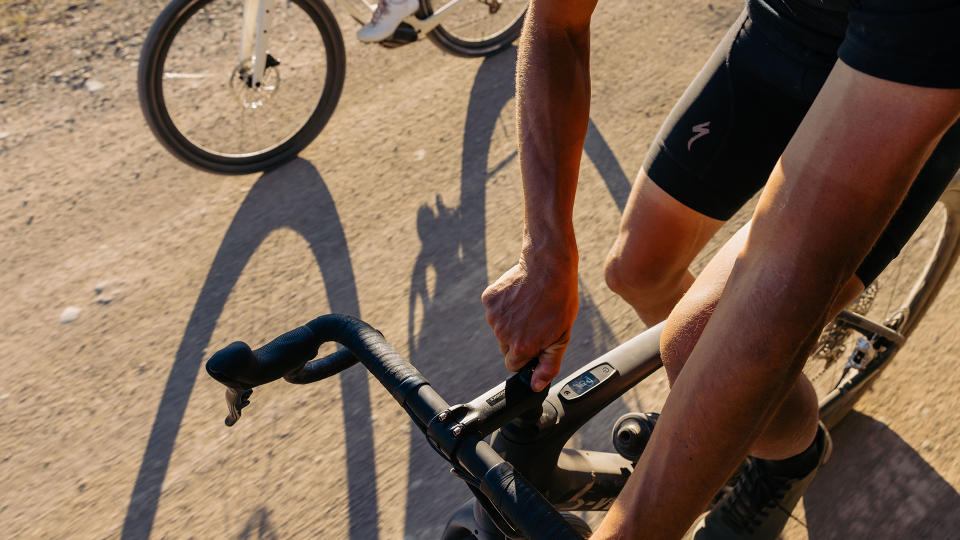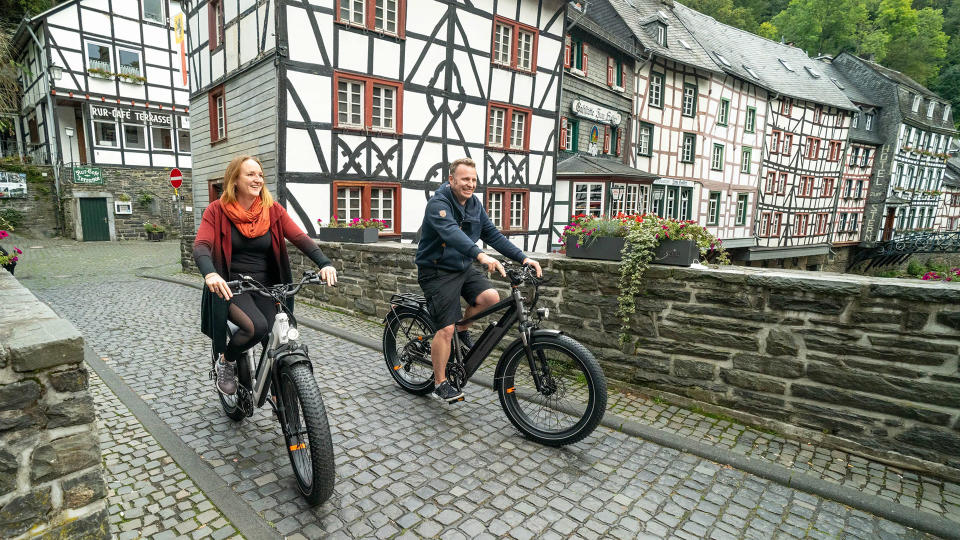Can you get fit riding an e-bike?

I have never been any good at cycling. My brief stint in a triathlon club confirmed this. I couldn't understand why my legs didn't spin as fast as everyone else and why my power output was always scores below everyone else. Yet when it came to the run, I was streaming past everyone. Turns out I'm a runner. I just have no strength when it comes to pedalling.
This is why, for me, an electric bike has always been an attractive prospect. While testing one out last year, I found that I was getting a good workout even with full power assist. After five days of using the bike, my legs were fatigued, and going uphill felt harder each day. I could go out and run 20k without a single ache, but hopping on the bike for 15 minutes was surprisingly tiring.
It got me thinking: can you get fit riding an e-bike, or is this only for bicycle-challenged people like me? Turns out, it's not just me. Physical trainer instructor and e-bike enthusiast Jim Richard thinks electronic bikes can be an excellent option for most people.
"This includes fitness newbies, those recovering from injuries, older individuals, or anyone looking to rekindle their cycling passion," he says, "They offer a blend of assistance and exercise, allowing people to start gently and progressively build up their fitness levels."
"I'm a big fan of e-bikes. They give us a flexible, enjoyable way to improve physical fitness, opening doors for more people to improve their cardiovascular health and endurance," enthuses Richard.

If you have minimal cardio capacity and do limited exercise, an e-bike will help you develop good habits without burning out. If you go out for a ride on a road bike, you might go too far and be exhausted, and then you have the problem of getting home again.
This can be disheartening, says Richard, whereas on an e-bike, you can put the power assistance on and let the bicycle make the return journey for you. Similarly, if you live somewhere hilly, you might be put off from cycling, but with an e-bike, you can cycle on the flat and then use assistance on the hills, enabling you to build confidence and travel further.
Richard says the key is to balance motor assistance with active pedalling without becoming over-reliant on electric power. So, what does an e-bike workout look like? Well, it all depends on your goals because the bikes can be used for increasing overall cardio fitness as well as improving speed and explosive power.
If you want to improve fitness, start with shorter, more manageable rides, gradually increasing the duration and the physical effort by reducing the motor assistance over time.
"Begin with 20 to 30-minute rides and slowly incorporate longer durations and tougher routes. Mix flat paths with mild inclines initially, and as you gain stamina, tackle more demanding terrains while decreasing reliance on the motor," advises Richard.
You can also incorporate fartleks, the Swedish word for speed play, a popular running training session. Ride without assistance as hard as you can for 30 seconds to a minute. Then, cycle with assistance for two to three minutes to recover. Repeat this five times. Over time, you can build up the number of repetitions and the length of time hard pedalling.

E-bikes are also a good option for combining exercise with commuting because there is always the option to be a power-assisted home. "If I've done a long shift at work, sometimes the last thing I want to do is running or cycling, but if you've got at the back of your mind, the assisted element to it, it makes it a little bit easier. And then you can build momentum and habits from there," says Richard.
And if, like me, you still find an e-bike hard work, it's essential to find the suitable model for you (see also: how to choose an e-bike). I previously tested an electric road bike, which, in order to ride on the road without a license or insurance, can only have a maximum power output of 250 watts and limits speed to 15.5 mph.
But off-road electric bikes are different. Many can go up to 1,000 watts, making them far more powerful and the assistance much greater. In the UK, these electronic bikes cannot be ridden on the road without being registered, taxed and insured, as they are in the same classification as mopeds.
You will also need a license and a cycling helmet. Riding them legally on public rights of way is also tricky because, technically, they must comply with the same rules as off-road motorcycles, which aren't permitted on many tracks and cycleways. The laws are currently a little muddy, so it's best to check with the manufacturer.
To be on the safe side, you can find off-road bikes, which are limited to 250 watts, which means they can be ridden anywhere a regular bicycle can without any caveats. Once you know whether you want a road or off-road, other things to consider are your budget and how long you will likely be riding.
Generally speaking, the more you pay for your new electric bike, the longer the battery life. Also, bear in mind that the more powerful the bike, the bigger the battery and the heavier the bike.
"If your battery runs out on a powerful bike, then you can end up working twice as hard to move the bike because of its weight. If your battery is done, you are making almost double the effort to ride at normal speed," explains Richard.
So what are you waiting for? It's time to saddle up.